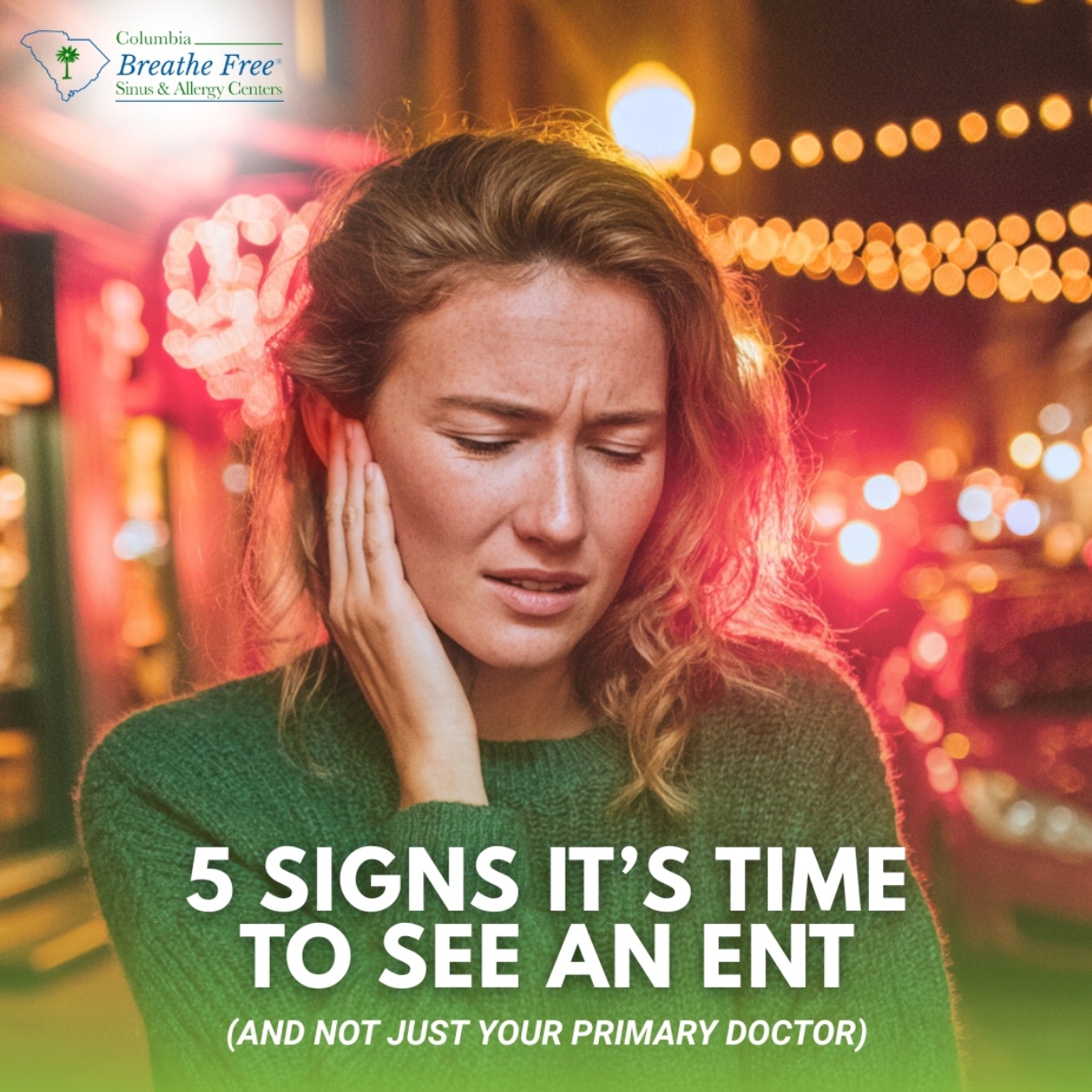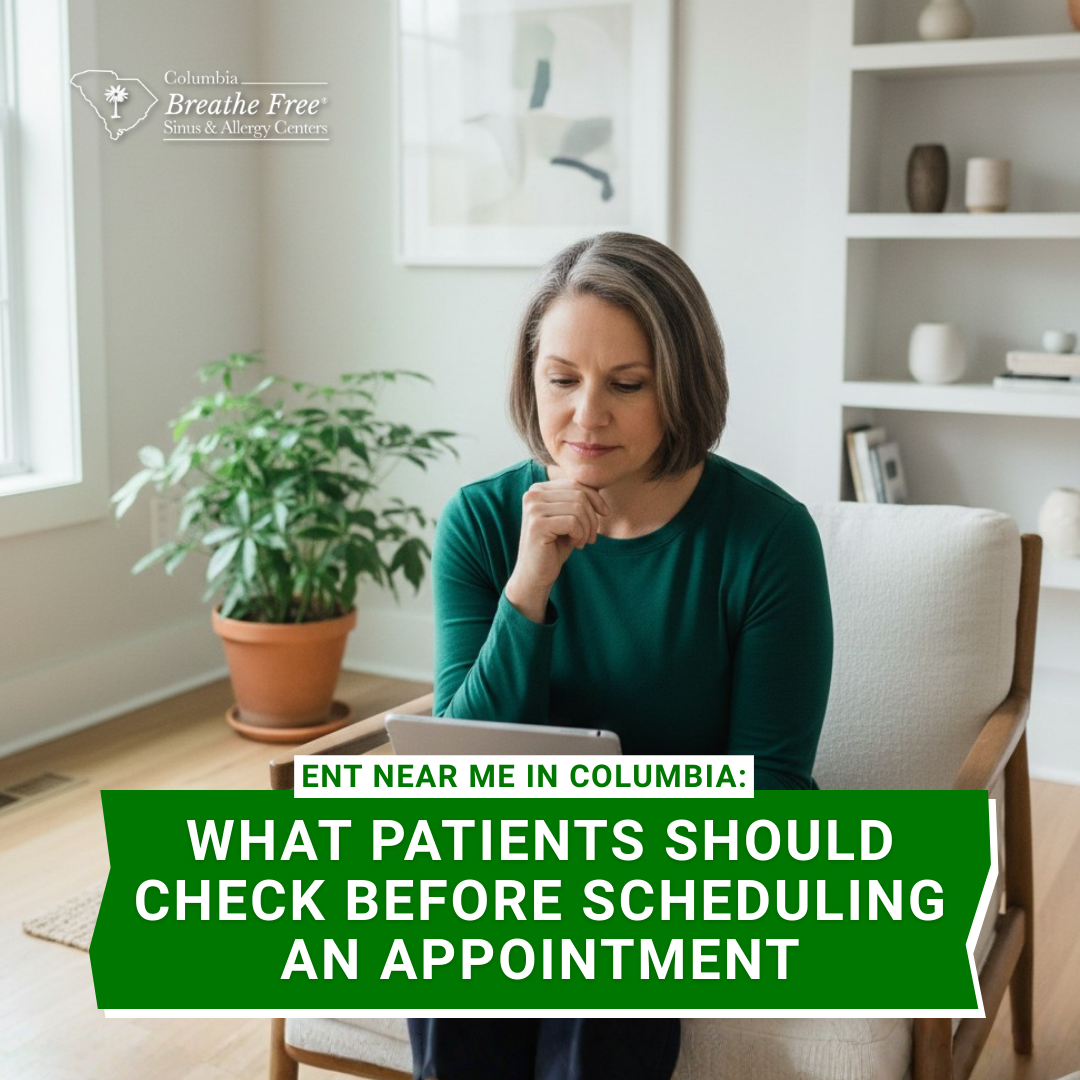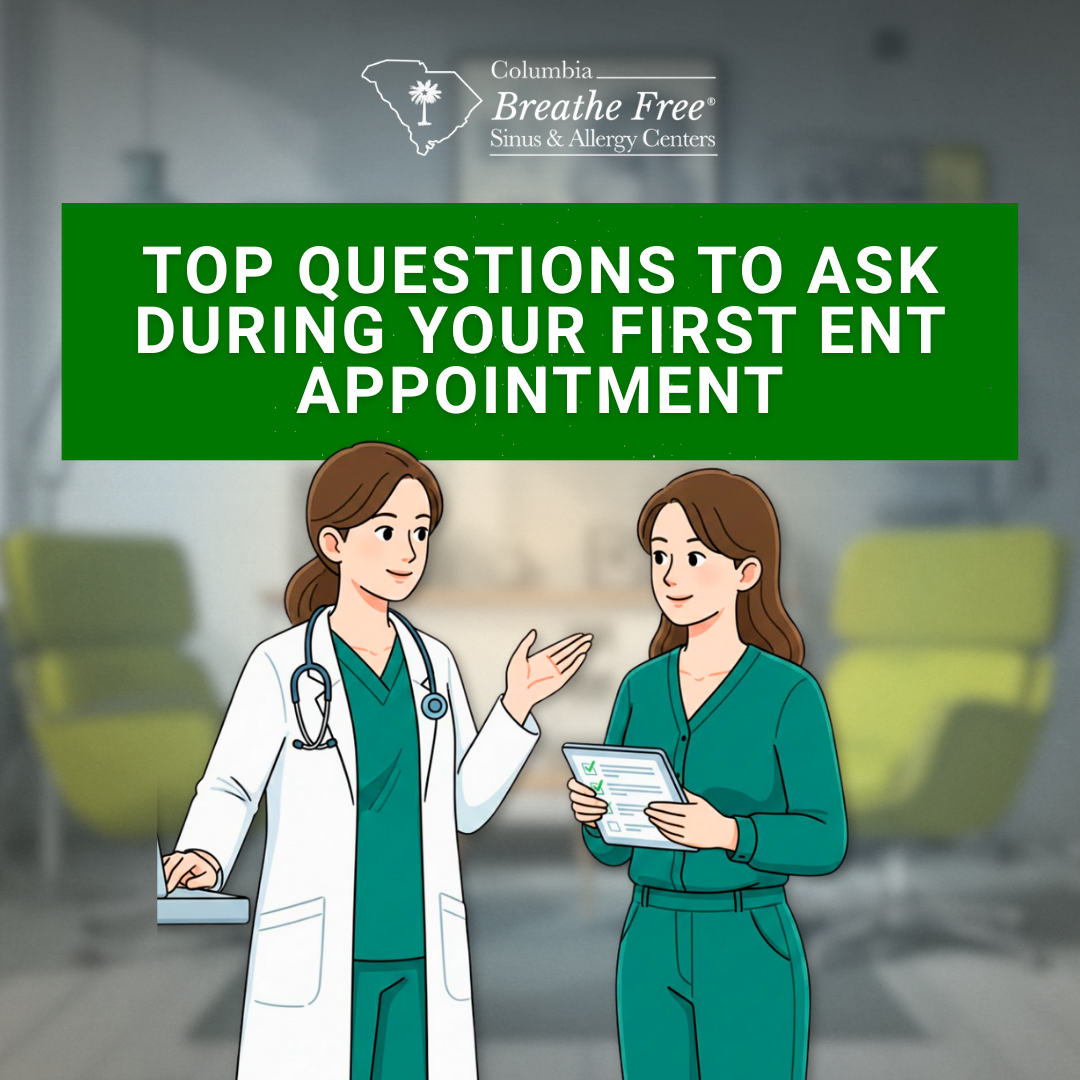
Winter Sinus Health in Columbia: Tips to Avoid Holiday Congestion
Winter in Columbia tends to be mild, but freezing days and occasional snow are not uncommon, adding a touch of winter wonderland to the season.
No matter how much snow you get, winter often brings dry air, which can wreak havoc on your sinuses. Dry air irritates the sinus passages, leading to inflammation and making it difficult for mucus to drain properly. This buildup creates an ideal environment for germs, viruses, and bacteria to thrive, increasing the risk of sinus infections.
Sinus infections and other winter-related sinus issues can quickly put a damper on your holiday season, causing symptoms like congestion, headaches, and fatigue. But with some proactive care, you can protect your sinuses and enjoy all the season has to offer.

Keep Your Sinuses Healthy and Enjoy the Holidays
- Boost hydration
Keeping yourself hydrated is key to keeping your sinuses healthy during winter. Drinking plenty of water will aid in keeping sinuses healthy as it helps thin mucus so it spreads over your sinus and nasal passages, also allowing proper drainage. When your body and sinuses start feeling dry, limit alcohol and caffeine consumption. Instead, drink more water in its place.
The dry winter air can be very drying to your nasal linings. Use ointments, hydrating moisturizers, or petroleum jelly to lubricate and moisturize your sinuses. Though it isn’t exactly a treatment for sinus issues, they do help make your nose feel better.
- Nasal irrigation with nasal sprays and steam inhalation
Nasal irrigation with nasal sprays breaks down mucus buildup and clears sinuses. This gets rid of congestion. It can also be hydrating to dry sinuses all the while flashing out pollutants and irritants from your sinus cavities.
You can also do it with steam inhalation. Simply pour hot water into a large bowl. Place your head over the bowl while having a towel cover your head. This traps the steam in. Then, breathe slowly through your nose to clear and moisturize the sinuses. You can also add a few drops of eucalyptus or camphor oil for more comfort.
- Use a humidifier for dry winter air
Winter air can be drying, even with Columbia’s typically mild winters. Dry air can result in a variety of sinus issues if not dealt with properly. Use a humidifier inside your home if the air starts feeling too dry. This introduces much-needed moisturize into the air which will be good to your sinus health.
- Keep your home and surroundings clean
Because of the colder breeze, people tend to spend more time indoors during the winter season. It’s important to always keep your home clean. Pay special attention to indoor irritants such as pet dander and dust mites. Regularly vacuum and dust around your home and change bedding regularly.
- Ensure good home ventilation
Stale air is drier so always ensure good ventilation in your home. If the weather allows, open doors and windows from time to time and let fresh air in. This can help improve indoor air quality.
- Know your triggers and avoid them
Winters in Columbia can be mild and make way for vegetation all year round without much pause. This means pollen and plant allergens can also be an all-year round thing. If you know you have allergies, it would be best to know exactly what your allergens are. This will allow you to take necessary precautions to limit your exposure to your triggers.
- Boost your immunity
Maintain healthy habits and boost your defenses against infections. Eat vitamin-rich foods and drink plenty of water. You can add vitamin supplements to your diet to further boost your defenses. Exercise regularly and practice frequent handwashing. Lastly, ensure you get enough rest and sleep every night.
Enjoy Holidays and Healthy Sinuses With Columbia Breathe Free
At Columbia Breathe Free, we are dedicated to helping our patients enjoy their winter holidays to the fullest – and this includes helping them find solutions for their sinus issues.
If you’re feeling blue this holiday season due to your sinuses, request an appointment with one of our experts, and let’s start working towards optimal sinus health, regardless of the season!
Other Blogs

5 Signs It’s Time to See an ENT (and Not Just Your Primary Doctor)
If you’ve ever dealt with persistent ENT issues like chronic nasal congestion, recurring ear infections, severe sinus pain and pressure, and hearing difficulties, then you know how they may affect your daily life, productivity, and comfort, depending on their severity. Many patients today are taking a more proactive approach to their health and may choose to seek care when they notice persistent or worsening symptoms.

ENT Near Me in Columbia: What Patients Should Check Before Scheduling an Appointment
Searching for an “ENT near me” in Columbia often means you’re dealing with ongoing ear, nose, throat, allergy, or sinus concerns. This article explains what ENT providers typically evaluate and how local environmental factors may influence symptoms, along with what to expect during an ENT visit and how treatment options are commonly discussed. It also covers practical considerations before scheduling, including services offered, insurance, accessibility, and appointment availability, and highlights how Columbia Breathe Free helps patients take informed first steps toward understanding and managing persistent ENT, allergy, and sinus symptoms.

Top Questions to Ask During Your First ENT Appointment
A first visit to an ENT specialist can feel overwhelming, especially when dealing with ongoing ear, nose, or throat symptoms. This blog outlines key questions patients may consider asking during their first ENT appointment, including topics related to diagnosis, treatment options, symptom impact, and costs. It also offers practical guidance on how to prepare for an ENT visit and what to expect, helping patients in Columbia, SC make the most of their initial consultation.
The information provided in this article is for informational and educational purposes only and does not constitute medical advice. It is not intended to diagnose, treat, cure, or prevent any disease or medical condition. Always seek the guidance of your physician or other qualified healthcare provider with any questions you may have regarding a medical condition or treatment.
Results may vary: Treatment outcomes and health experiences may differ based on individual medical history, condition severity, and response to care.
Emergency Notice: If you are experiencing a medical emergency, call 911 or seek immediate medical attention.
